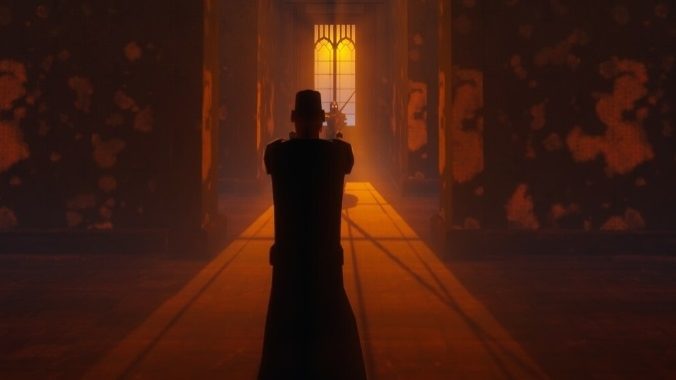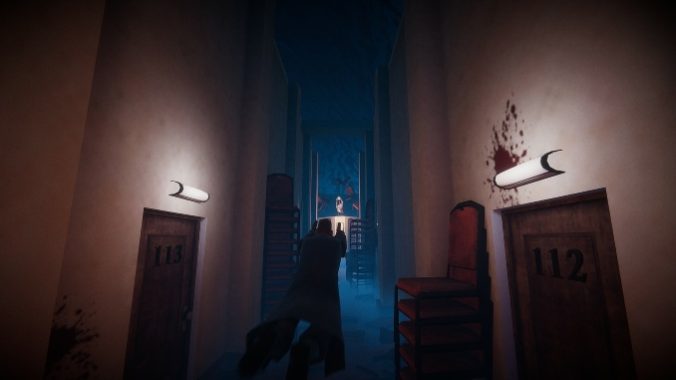
Strange Scaffold has made a name for itself in recent years for constantly thinking so incredibly far outside the box for its games. Space Warlord Organ Trading Simulator for example is an honest to goodness game of playing the market, except the commodities being bought and sold are, as the title suggests, the bits and bobs of other lifeforms. It’s gross, insanely dark, and also a thrill to play. Sunshine Shuffle, their latest release, is a bit breezier but no less odd: take the aesthetics of Animal Crossing and smash ’em into The Usual Suspects as you play Texas Hold Em’ with a crew of career criminals whose past seems like it’s finally catching up to them. The playgrounds that Xalavier Nelson Jr., founder of Strange Scaffold and frequent creative director of its projects, likes to play in tend to straddle that line between the mundane and the ludicrous to bafflingly successful degrees, so it’s no surprise that his latest, the Max Payne-inspired El Paso, Elsewhere is already shaping up wonderfully.
Beginning in a dingy El Paso motel, you play as James Savage, who besides being voiced by Nelson Jr. himself, is also exes with Draculae, the lord of vampires. As she begins conducting a ritual that will bring about the end of days, it falls on James to find her, save the innocents she’s kidnapped and put a violent stop to her plans. Only James, much like his inspiration, is battling his own demons before he descends into literal hell to gun down others. An arresting opening monologue that sets the stage for the demonic neo-noir drama to come establishes a few things, chief among them that James is an addict who presumably broke from a half year of sobriety for this “one way trip” to deal with Draculae. There are toxic relationships, and then there’s whatever these two had going on, clearly.
Nelson Jr.’s performance in the lead role, even this early on, is nothing short of remarkable. His narration has a breathy intimacy that sells you on the boatloads of ache Savage is supposedly drowning in pills. His pulpy delivery, and his cheeky fourth wall breaks, immediately brought the character, and the fantasy of it all, to life. That and the expert direction of the opening cutscenes had me hanging on every line until finally it was time for me to blast my way through this motel (and consequently, Hell) in viscerally cinematic slow motion.

Here, in the dimly lit low-poly halls of the motel (and beyond), is where El Paso, Elsewhere really roars to life though. Stages are bite-sized, though feel labyrinthine in that way that traversing hotel passages alone vaguely feels like you’ve stumbled into the Backrooms. Except instead of helplessly being chased by malevolent forces, you have guns, because as Savage puts it one time, “It’s Texas. Of course, they’ll have guns.” Your primary objective is to save all the hostages on the stage, helpfully illuminated by physical checkpoints that emit beams into the sky, which you can see as part of the dreamlike skyboxes. Besides your repertoire of automatic weaponry, you’ll also have stakes to drive through enemies that get up close but hopefully, you’ll eliminate most of the demons you encounter as you dive in slow motion and blast them to pieces. Though you begin with dual pistols that feel great and even collect an uzi and rifle in the second level, the shotgun you collect a little ways down the line is particularly satisfying. It violently shakes your screen and eardrums, but so long as your crosshair is over something when you pull its trigger, they’ll crumple. To complement the action, Strange Scaffold have even sculpted a hip-hop concept album, which Nelson Jr. performs on, that acts as the game’s score. A graveyard level in the game’s demo features a track about a “human sundae” that went far harder than I initially expected it to.
The whole thing feels ripped out of the early aughts, but tuned up to obviously curtail the wonkiness of the era. Despite appearances, El Paso, Elsewhere is smartly modern and controls tightly. Among it’s quality of life updates to the formula are a dodge roll to accompany your dive (which can be done in real time, slow motion is triggered by an entirely different button) and clear neon-tinged signposting of resources like pills and stakes, as well as the aforementioned checkpoints pointing to hostages. Given the game’s increasingly blurred sense of reality and clear noir tone, these implementations read like attempts to make a mostly diegetic UI work in the fiction and eliminate any chance for clutter. There are even mechanics, or lack thereof, that smartly keep you in the moment and provide tiny instances of tension, like the fact that your guns don’t auto-reload when you’ve emptied the clip. In one instance, where you are defending against some waves in a bathroom, this led to countless scares where I pulled the trigger only for the depleted guns to click and then ate shit.
El Paso, Elsewhere is both intimate and insanely propulsive. Its in-your-face action reminds me obviously of Max Payne, but also the kinetic griminess of Kane & Lynch 2. It’s not just a throwback to a genre of moody third-person shooters, it feels in step with a lineage of games with a deeply felt sense of place. That and the confident direction of the few bits of story I got to see assures me that this is the full-throated expression of a team firing on all cylinders.
Moises Taveras is the assistant games editor for Paste Magazine. He was that one kid who was really excited about Google+ and is still sad about how that turned out.